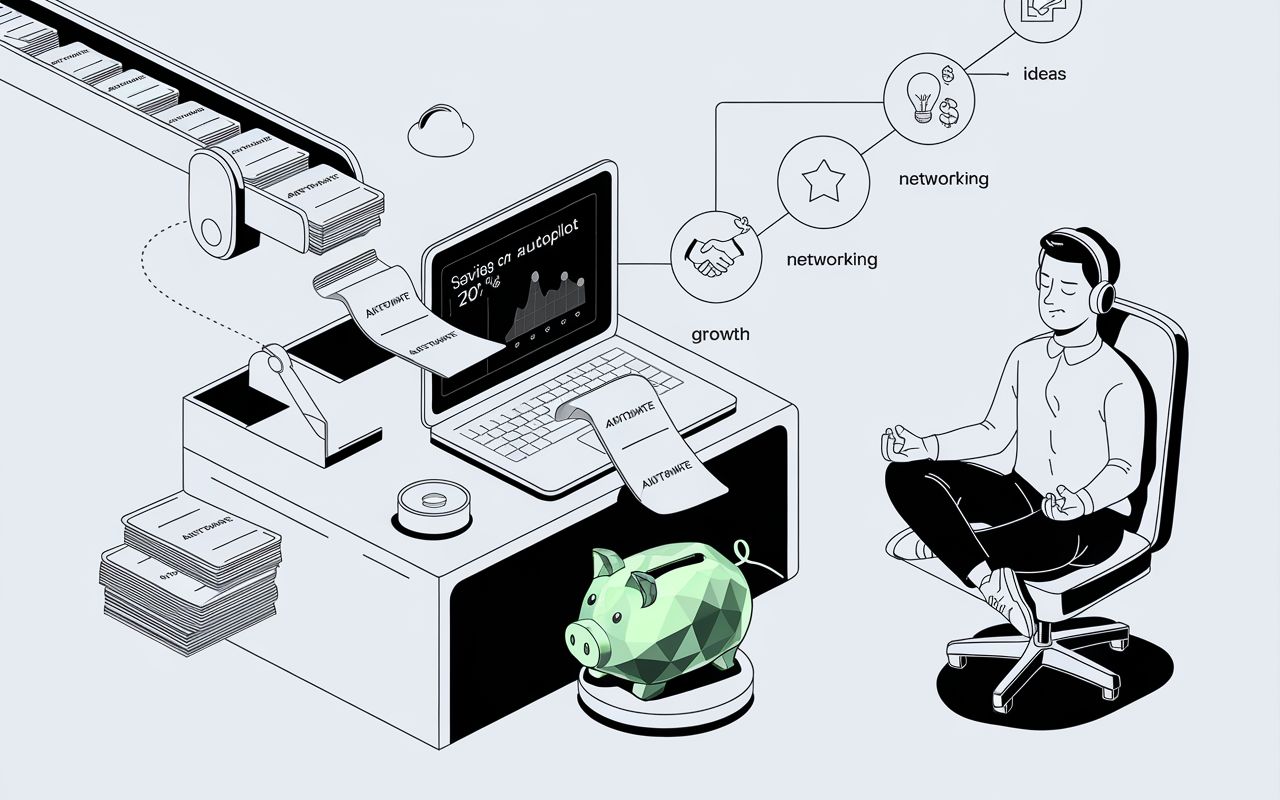- IVAN HUG
- Posts
- The 7-Hour Career Killer: How Financial Stress Sabotages Success
The 7-Hour Career Killer: How Financial Stress Sabotages Success
Why your credit card anxiety is costing you more than money—and the automation secrets that fix it
Picture this: You're in the middle of presenting to senior leadership when your phone buzzes. Credit card payment due. Suddenly, your brilliant point about Q4 projections evaporates as your brain calculates whether you can cover it.
Sound familiar? You're probably losing 7 hours of productivity every week to financial anxiety, according to UC research. That's nearly a full workday spent mentally juggling bills instead of crushing your career goals.

But here's what nobody tells you: even six-figure earners fall into this trap. The solution isn't just more money—it's smarter systems.
If you're ready to reclaim those 7 hours and supercharge your career focus, you're in the right place.
The $100K+ Paradox: Why More Money Doesn't Fix Everything
Here's the counterintuitive truth that'll save your sanity: salary increases often amplify financial stress rather than eliminate it.
Why? Psychology beats payroll every time.
When financial worries constantly interrupt your flow state—especially during high-stakes moments—your memory, decision-making, and creativity all nosedive. You're not just losing focus; you're losing opportunities.
I've watched brilliant professionals torpedo their advancement because they couldn't stop mentally calculating expenses during crucial meetings. The irony? Many were earning more than their managers.
The real cost isn't just personal. Companies hemorrhage money on turnover driven by financial stress. Training replacements, delayed projects, senior staff who can't afford to retire—everyone pays when financial anxiety goes unaddressed.
The Three Cognitive Traps Killing Your Progress
These psychological blind spots operate below conscious awareness, silently sabotaging your career trajectory:
1. Present Bias: The Retirement Plan Procrastination
You know that 401(k) match is free money. Yet you delay enrollment because the paperwork feels overwhelming right now. This cognitive glitch costs the average professional over $50,000 in lost compound growth during their career.
The neuroscience: Your brain weighs immediate inconvenience roughly 2.5x heavier than future benefits.
2. Loss Aversion: The Golden Handcuffs Effect
We fear losing twice as much as we value equivalent gains. This explains why you might cling to a mediocre job, terrified that switching could lead somewhere worse. Meanwhile, you're missing opportunities that could boost your income by 15-30% through strategic career moves.
3. Hedonic Adaptation: The Promotion Treadmill
Remember the euphoria from your last raise? That joy faded faster than expected. You adapted to your new lifestyle and immediately started craving the next increase. Instead of sustained happiness, you become someone perpetually chasing more—with expenses that scale alongside your income.
The Automation Advantage: Set It and Forget It

Here's where behavioral economics becomes your secret weapon: automation eliminates decision fatigue.
Every time you manually decide whether to save, you're fighting against evolutionary programming that prioritizes immediate needs. Remove the decision, and you remove the friction.
Real-world impact: Shlomo Benartzi's research shows that even a 1% automated savings increase can generate an additional $100,000 over a career. That's the compound power of "set it and forget it."
JPMorgan Chase's "My Financial Path" AI, launched in 2024, automatically allocates paycheck portions to savings. Over 35 major companies implemented it because employees with automated finances waste 60% less time on money worries.
The Middle Eastern proverb says it best: "Even dust, when gathered, can form a mountain."
Career-Stage Financial Blueprints
Your automation strategy should evolve with your professional trajectory. Here's the playbook:
Early Career (0-5 Years): Foundation Building
Employer Match Priority: Contribute enough to capture 100% of company matching
Emergency Buffer: Target $15,000 in high-yield savings via automatic transfers
Debt Elimination: Automate credit card payments above minimums
Investment Goal: 0.5x to 1x annual salary by age 30

Mid-Career (5-15 Years): Acceleration Phase
Skill Investment: Automate monthly contributions to certification/education funds
Career Pivot Fund: 6-12 months expenses for strategic job changes
Portfolio Diversification: Spread across stocks, bonds, alternative investments
Investment Goal: 3-4x annual salary by age 40
Senior Professional (15+ Years): Optimization Mode
Catch-Up Contributions: Maximize age 50+ retirement account limits
Estate Planning: Automate charitable giving and inheritance strategies
Legacy Preparation: Backdoor Roth conversions and long-term care insurance
Investment Goal: 10-12x annual salary by age 60
Unconventional Motivation Tactics
The Stress-to-Opportunity Flip
Some forward-thinking companies offer "Financial Innovation Grants"—$500-$2,000 funds that employees can access for skill development or side ventures. Instead of being paralyzed by money anxiety, channel that energy into growth investments.
Gamify Your Progress
Treat financial milestones like martial arts belts:
White Belt: $1,000 emergency fund
Green Belt: Debt elimination milestone
Black Belt: Advanced retirement optimization
Each level unlocks new benefits: mentoring access, professional development funds, or sabbatical opportunities.
The 30-Day Financial Focus Recovery Plan
Transform your relationship with money through systematic automation:
Week 1: Foundation
Day 1: Increase retirement contribution by 1%
Day 2: Download budgeting app (YNAB for detail, Acorns for simplicity)
Day 3: Start $25/week automated emergency fund transfer
Day 4: Cancel unused subscriptions with Rocket Money
Day 5: Research salary benchmarks for your role
Week 2: Optimization
Set up automated bill pay for all fixed expenses
Negotiate better rates on phone/internet/insurance
Identify one career-advancing certification or course
Week 3: Acceleration
Increase retirement contribution another 1%
Schedule financial wellness consultation (many employers offer free sessions)
Consider professional financial advice for complex situations
Week 4: Systematization
Verify all automated transfers work smoothly
Celebrate first milestone achievement
Visualize your 1-year, 3-year, and 5-year financial position
The Mental Freedom Dividend

When you automate financial decisions, you don't just save money—you reclaim cognitive bandwidth.
Those 7 hours of weekly mental energy return to where they belong: advancing your career, developing innovative solutions, or simply enjoying life without guilt.
Recent Federal Reserve data shows 62% of Gen Z workers experience financial anxiety multiple times weekly. This demographic saw credit card debt increase 62% from 2021-2023. But workers who implement automated financial systems report higher job satisfaction, lower burnout, and faster career progression.
Your Next Move
The fastest way to reduce financial stress isn't earning more—it's removing financial decisions from your daily mental load.
Start with one action this week:
Bump retirement savings by 1%
Set up a $20 weekly automated transfer
Download a budgeting app and link your accounts
The compound effect is remarkable: not just financially, but cognitively. Every automated system frees mental space for the work that actually moves your career forward.
You deserve a career driven by innovation and growth, not financial anxiety. Make the move. Your future self—and your paycheck—will thank you.
Ready to automate your way to financial freedom? Next week, I'm breaking down the exact apps and systems that top performers use to eliminate money stress forever. Plus, the surprising psychology behind why some people save effortlessly while others struggle—even at identical income levels.
What's your biggest financial stress right now? Hit reply and let me know—I read every response and often build future content around your challenges.
